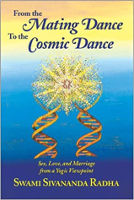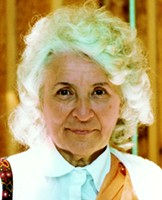
Image by msandersmusic
Each culture sees human life as a progression through a series of stages. These systems may have been developed in an attempt to understand the evolution of human beings and the vast differences in human intelligence. The search for an explanation might have begun with an exploration of the five senses, with the ability to think and interpret evolving out of that exploration and becoming the sixth stage, and the longing to go beyond it all creating the seventh.
We see this evolution in the seven chakras of the Kundalini system, which indicates most clearly the process of human development, because it is the culmination and combination of all paths. We see it as well in the seven rungs of Jacob's Ladder in the Judeo-Christian tradition.
The levels of human development are also symbolized by the Buddhist Wheel of Life, concentric circles arranged according to the goal in life. Those people on the outer circle are just holding onto life; for them it is a matter of survival. Each one of us has to move through many lifetimes, from the outer circle to those circles within. At the very central point of the Wheel is the Buddha of Infinite Light, the point that is completely motionless, balanced. All of these systems -- yogic, Christian, or Buddhist -- can be used as frameworks for learning discrimination, with each level or circle representing a further refinement of our power to discriminate.
Levels of Awareness
The Inner Light, Buddhahood, Christ-Consciousness, Nirvana, as specific stages of the mind, are often used as the central point or goal of human endeavor and development.
These ideas from the past are continued in present-day life when we measure our potential as levels on intelligence tests. But even the particular phase of life we are in is an indicator of development, because we have achieved that phase through the choices we have made, and those choices depend on the discrimination we have practiced -- our level of awareness.
It is commonly accepted that certain preliminaries must be fulfilled in order to achieve specific goals. For example, the baby does not need to know the multiplication tables or to recognize the root of a word in Latin or in Greek, nor is it expected to be able to walk a tightrope or perform physical gymnastics. But there are very definite expectations of the understanding, behavior, and training at that stage. Moreover, what takes place in the first few years of life has a tremendous impact in later years and can be crucial to the possibility of developing further.
We speak of the infant, the toddler, the preschooler, the kindergarten child, and the elementary school student. These various stages are accepted as a logical progression. If we consider human potential and its development in the same light, we see that the powers and qualities we can achieve also evolve through similar stages.
New Phase, New Skills
Whenever we enter a new phase or learn a new skill, we can detect these same stages, although we may move through each of them very rapidly. The newcomer to physics feels as ignorant and helpless as a baby. To become an astronomer or a physicist, one must possess a certain level of ability in mathematics; to become a composer or conductor one must develop the ability to read music and play an instrument.
Ernest Wood, in his book Practical Yoga: Ancient and Modern, has given us a fresh approach to the ancient concepts of developmental levels, to help us understand the stages we already perceive in life. He uses five stages to demonstrate the evolution of human consciousness, and the powers that can be developed in each, the last being the full realization of one's potential. I have added a sixth to indicate the potential that is promised by Yoga: the emergence of the enlightened being.
The six stages form convenient divisions to help us understand the complexities of human nature, but this does not mean that people are categorized exclusively into any one of these divisions. In fact, we never function on one level only, but on several at the same time. However, in order to assess more clearly the problems that cause us pain, and to point the way to solutions that will lead to a more enlightened way of being, it is necessary to distinguish between the various stages.
The first stage: Mineral-Man
Ernest Wood has named each of these stages. The first stage is Mineral-Man, representing people who live by their instincts, with little desire to achieve a different position or increase their knowledge. At this stage we want nothing more than to gratify our basic appetites for food, shelter, and sex. Intelligence is at its lowest, so our limited ability to learn and remember makes it impossible to attain precision in skills or to broaden our understanding, often to the point where we are even unable to recognize the possibility that we can improve. At this level we lack reverence for life and appreciation of beauty in art or nature. We lack initiative and take no responsibility for our actions.
The second stage: Vegetable-Man
The second stage is named Vegetable-Man, also an apt description. Large numbers of people live like vegetables, although perhaps a better term is weeds, which push into any cultivated garden, destroying it if they are left unchecked. We can recognize in ourselves the greed for self-satisfaction that pushes everything else out of its way.
Greed is the motivation for people primarily in the mineral and vegetable stages of development. Initiative and creativity are still dormant, and self-gratification is so dominant that if any finer forces are awakened, they are nipped in the bud by the prevailing greed and self-importance.
The third stage: Animal-Man
Animal-Man, the next stage, is more aware of ego and its games. In this phase we add cunning to our vegetable pushiness, so we become more clever in controlling others, with little regard for their right to dignity. Although we have not yet fully developed an appreciation for finer expressions of creativity, we make a pretense of being interested. However, simply being exposed to a creative atmosphere allows a slow entry of this dimension into our lives.
In their ignorance about life and themselves there is a certain innocence about people in the stages of Mineral-Man and Vegetable-Man. They grab things without awareness of what they might destroy in the process; they may even take delight in the destruction just for the pleasure of destroying. But as our awareness increases at these levels, destruction becomes a conscious, intentional act and it is ugly. No longer is hunting limited to obtaining food for survival; it becomes an ugly act of killing for its own sake.
When pleasure enters into killing, it does not stop short of killing human beings. People who live mainly at the level of Animal-Man increase their abuse of power in all areas. Their cleverness masks itself as wisdom, covering the ugliness ever more skillfully. Their urge to control comes in many disguises. Their intention to exploit increases like a gathering wave.
To someone at the level of Animal-Man, sex is no longer just a biological function as it is for those at the mineral or vegetable stage; sex now is used primarily for pleasure. Instinctual biological functioning is Mother Earth's trap to continue her numerous species. Many forms of birth control have been devised to avoid the possibility of pregnancy, and so prevent interference in our pursuit of pleasure. Our desire for convenience and our reluctance to take responsibility for unwanted offspring then trigger legal actions that expand into laws about, for example, abortion, paternity, and child support.
By not taking responsibility for their sexual behavior, men and women in this stage are helpless and are therefore at the mercy of those whose only love is power. That power is exercised in all areas of life, from advertising that exploits our basic instincts, to social policies that govern the family. The politics of controlling the growth of populations and their potential for exploitation is a battle in which those who are controlled hate the controllers, and the controllers hate those they control.
We can think of life as a schoolhouse, with the lowest grades having the greatest number of students. As the learning process continues, the numbers become fewer and fewer, because the problems become increasingly complex. Similarly, the greatest number of people in our society are still mainly in the first three levels of development and, although we may smile sardonically at primitive people for creating gods and goddesses with the hope that they will fulfill their desires, we do the same thing.
We can see that clearly in our society's emphasis on food and sex. We often use sex for purely physical gratification, as an expression of personal power, and for punishment and reward. And although we recognize that its purpose is procreation, we strongly battle this intention of nature. Our attempts to circumvent any obstacle to our sexual gratification have led us to serve our own gods and goddesses of power.
In the first three stages, we learn from the challenges presented to us by the activities and responsibilities of sex, love, marriage, family, and children, and apply in our lives what we have learned, just like students passing their grades in school. But the high price in pain and disappointment that comes from the gratification of self at all cost brings the dawning understanding of the futility of such pursuits. The desire for something more worthwhile comes to life within us -- something that justifies the price, and we begin to ask ourselves, Why am I here?
We have searched for answers to that question in religion and science, philosophy and politics, throughout history. Our struggles in the animal stage force us to look more closely at this question, to lift our vision, expand our horizon, and finally take the daring step into the next stage, that of Man-Man. Here we are faced with the need to control instincts and to take charge of our lives. But logic is not enough, and an understanding emerges that it is through intuition that we can make the leap.
The fourth stage: Man-Man
The fourth stage in life, called Man-Man, means to become truly human: we become considerate of our fellow beings, appreciate their accomplishments, and recognize that competition is an offspring of our struggle for survival. Now we can understand survival in a new light. In this stage we need new visions to provide meaning for life.
The burden of the first three stages is not easily thrown off, and the perspective of the new horizon appears so vast and overpowering that we can easily become discouraged. Our familiar ways are still attractive. We may feel the agony of being close to something that is struggling to emerge from the depths of our inner being, yet is held back by an indefinable fear.
At this level we begin to apply discrimination rigorously. We begin to question the origin of the morals of our culture, how they have come about, whether they are indeed just taboos of the past, or if they still have validity. Ethics, responsibility, and commitment versus the pursuit of purely personal pleasure come under our scrutiny. What we had previously considered right becomes more and more questionable when we enter the fourth stage.
As we consider new viewpoints, the question arises whether we should or can change our attitudes toward sex. Can sex become a transforming power that elevates us into a different state of awareness? Does our search for higher values require self-mastery and control of sexual urges? On this level we might for the first time consider such an idea as celibacy or chastity, or we may look for a more fulfilling sexual relationship, one that now includes love. At this point, we ask ourselves for the first time what love means to us.
Sexual love implies a different quality of interaction, and perhaps a new dimension is added to what had been simple, raw instinct. As we cultivate ourselves and slowly move along the path of evolution, some laws of the first three stages no longer apply, or they change drastically.
In human history, the concept of love emerged slowly from the world of purely sensory experience. The idea of love could come only after our longing for more than gratification directed our vision beyond the merely physical experience. Out of this longing arose both the Christian concept of altruistic love (agape) which made a great impact on ways of thinking and living in the Western world, and the Eastern teachings that demand self-mastery, control of the basic sex urge, and the ability to forego greed and to renounce self-will. When these principles are applied to our lives, a new atmosphere is then created in which love can unfold, and allow us to transcend the lower levels of being.
From a yogic point of view, when we become truly human our awakening to the purpose and higher values in life shows that we understand, perhaps only intellectually at first, the relationship between individual consciousness and Cosmic Consciousness. With this increasing awareness, our ability to accept responsibility expands because we more fully understand our personal path of evolution.
Pursuing the goal of Higher Consciousness
People are at many different stages of development. But the only real difference between them is that some know they are divine, and others do not yet have that awareness. In many lifetimes each one of us has gone through the lower forms of evolution, and in each lifetime we have refined ourselves. We have participated in the course of evolution as we understood it and were capable of carrying it out.
Now, at this level of becoming truly human, we can choose not to be controlled by the lower instincts, and our sexual expression assumes different qualities, as does all of life. But we must remember that there is an interplay of the forces within us. We never function on one level only, but on several at the same time. For example, there is an interplay of the senses at all times: we never only see, but at the same time we also hear, feel, taste, and smell. So we cannot always expect ourselves to be operating only on the highest level.
Our increasing awareness and development bring the realization that pursuing the goal of Higher Consciousness carries with it a certain obligation. Once we eat from the Tree of Knowledge, we have responsibility. At this point we must decide whether or not our desire for Higher Consciousness is so pressing that we must pursue it at all cost.
It is difficult to change human nature until we have achieved the first degrees of awareness, of becoming truly human. The changes involved entail suffering for a time, but the suffering that results from greed, selfishness, and self-glorification is unending and undiminishing. Character-building, therefore, is the necessary first step. In the yogic tradition, the next step is to ask the important question, What is the purpose of my life?
The fifth stage of the spiritual being: God-Man
After the fourth stage of human nature, we approach the fifth stage of the spiritual being: God-Man. Here we know that our search for higher values and spiritual development is cooperation with our own evolution. The thought may now enter our mind that the purpose of life is not orgasm.
Awareness of the fleeting nature of this experience brings pain, because we realize we truly are alone. But at the same time, we recognize that we have always been alone. The busy bee of the mind with its continuous hum never allowed us to recognize that fact before. We begin to understand, too, that our purpose, as dwellers in both the spiritual and the physical realms, is to move beyond the animal aspects of the physical and to find our way to Higher Consciousness.
At the level of God-Man we want to bring children into the world consciously: not as a by-product of sexual pleasure, but as individuals whose steps we can guide toward a glorification of divine life. This is the stage at which we recognize that we are a bridge between two worlds -- the physical material world and the spiritual world -- and we have consciousness that is itself a power, a vortex of energy that is indestructible. Our hunger for acclaim is replaced by a hunger for true knowledge, as our search for the Light begins, our search for the essence within.
Through an intense process of thought and discrimination, at this level we have elevated the marriage relationship, and now we aim for the mystical marriage. And with the intuitive understanding that ahead there lies a greater union of the individual consciousness with God-consciousness, we realize that the physical expression of sex might not be essential. There is no suppression and there is no struggle because we have laid our foundation. Even in certain tantric systems, which do make use of the sex force, there is no seeking for personal gratification, but a surrender to whatever form in which the sexual energy might be expressed.
At this stage we begin to have an intuition of a paradise lost. We begin to understand that this physical existence is not our proper home. In each religion we find stories that attempt to answer the primary question of why we are here and why Paradise was lost. In Christianity there is the story of the fallen angels.
One of the Eastern stories tells of how, at one time, there was a great fire on the earth. The waters came, putting out the fire, and the young gods in mid-heaven, watching the drama below, said, "Now that earth is normal again, let us go and see what it is like." So the young gods descended to the earth plane. Some came and went, but others stayed too long on the earth and were trapped by their curiosity. Their fine and ethereal bodies became so condensed and hardened that they could not return to the mid-heavens.
The other gods of mid-heaven who came back for them said, "Because of what you are doing, you cannot come back. Your bodies have grown too heavy."
So the earthbound young gods became worried and said to one another, "If our bodies grow heavy, they will die like the bodies of all the other animals." But they saw that the animals could reproduce themselves, and they imitated the animals in the hope that they could reincarnate and eventually find their way home again. Perhaps we can consider this the source of the idea of the Fall of humanity.
In Hindu mythology, Brahma created four mind-born sons. The story may be telling us symbolically that procreation can be the result of not only physical union, but also of the power of mind over matter. To move out of the animal kingdom, we must look at sex in a new way. When the feeling of homesickness for our "Heavenly Home" becomes intense, we may accept the possibility that, by freeing ourselves from the weight of habitual thinking, we can make our way back. The practice of Yoga offers us that choice.
The sixth level: The Divine Union
The Divine Union -- the sixth level -- can take place in many ways: it can include the physical body and it can transcend the physical body. The human being who reaches the sixth level of Liberated-Man, having attained the potential promised by Yoga, provides the example for others by following the guidelines that are set out in all Scriptures.
Timeless Books. ©1992.
Website http://www.timeless.org
Article Source:
From the Mating Dance to the Cosmic Dance: Sex, Love, and Marriage from a Yogic Perspective
by Swami Sivananda Radha
 What part do love and marriage play in the pursuit of spiritual fulfillment? Do the bonds of love, sex, and marriage preclude achieving spiritual liberation? In a daring and ground-breaking book, Swami Radha addresses many of the fundamental questions of relationships. She invites readers to inquire into the purpose of life and to explore the mating dance, often mistaken for love, as well as the cosmic dance?that ultimate potential that is available to anyone willing to go in search of it.
What part do love and marriage play in the pursuit of spiritual fulfillment? Do the bonds of love, sex, and marriage preclude achieving spiritual liberation? In a daring and ground-breaking book, Swami Radha addresses many of the fundamental questions of relationships. She invites readers to inquire into the purpose of life and to explore the mating dance, often mistaken for love, as well as the cosmic dance?that ultimate potential that is available to anyone willing to go in search of it.
About The Author
 Swami Sivananda Radha was the first Western woman to be initiated into sanyas. Her numerous books have been published in several languages.
Swami Sivananda Radha was the first Western woman to be initiated into sanyas. Her numerous books have been published in several languages.
Workshops and classes based on Swami Radha's teachings are available at Yasodhara Ashram and at affiliated centers called Radha Houses located in urban communities internationally.


























